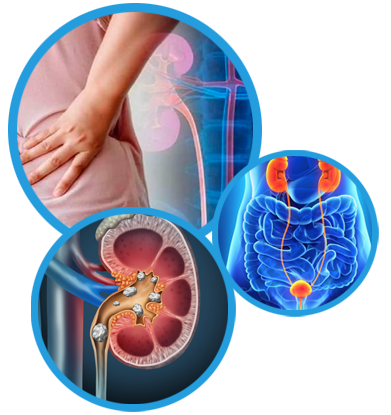
Urinary Retention
It can occur suddenly (acute urinary retention) or develop gradually over time (chronic urinary retention).
Urinary retention can be uncomfortable and may lead to complications such as urinary tract infections or bladder damage if left untreated.
2. Symptoms
- Difficulty starting urination
- Weak urine stream or dribbling
- Pain or discomfort in the lower abdomen or pelvis
- Frequent urination, with only small amounts of urine passed each time
- Sensation of incomplete emptying of the bladder
- Urinary urgency or hesitancy
- Nocturia (frequent urination at night)
- In severe cases, urinary retention may lead to inability to urinate at all, accompanied by severe pain and distention of the bladder.
3. Causes
– Weakened bladder muscles, often due to nerve damage from conditions such as diabetes, spinal cord injury, or neurological disorders
– Medications that affect bladder function, such as certain anticholinergic drugs or opioids
– Post-surgical complications, particularly after procedures involving the bladder or prostate
– Psychological factors such as stress or anxiety, which may lead to functional urinary retention
4. Diagnosis
– Additional assessments may include urinalysis to check for signs of infection or other abnormalities, measurement of post-void residual volume using ultrasound or catheterization, and urodynamic testing to evaluate bladder function and urine flow.
– Imaging tests such as ultrasound, CT scan, or MRI may be performed to identify any structural abnormalities or obstructions in the urinary tract.
5. Conclusion
– Urinary retention is a potentially serious condition that requires prompt diagnosis and treatment.
– Treatment options for urinary retention may include catheterization to drain the bladder, medications to relax bladder muscles or reduce prostate enlargement (if applicable), or surgery to remove obstructions or repair underlying causes.
– The prognosis for urinary retention varies depending on factors such as the underlying cause, the severity of symptoms, and the patient’s overall health.
– Seeking evaluation and treatment from a healthcare provider is important for managing urinary retention and preventing complications.
– Support from healthcare providers, family, and friends can play a crucial role in navigating the challenges associated with a diagnosis of urinary retention.
Current News & Event
Free Health camp
This camp will take place this Sunday, April 14, 2024 from 9 am to 1 pm.






